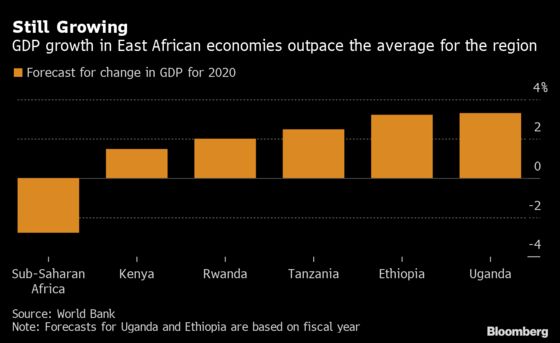East African finance ministers will have to strike a balance between spending to rebuild economies battered by the coronavirus scourge and burdening their already heavily indebted nations with more loans when they present 2020-21 spending plans.
Foreign exchange from mining and agricultural exports, tourists and remittances have dropped precipitously, and revenue from domestic activity is drying up, forcing governments in the region with some of the world’s fastest-growing economies to borrow. To stimulate output, countries such as Kenya, Uganda and Tanzania, whose budgets will be read on Thursday, will re-prioritize spending to focus on health, tourism and labor-intensive infrastructure projects, according to Jacques Nel, head of Africa macro at NKC African Economics.
“Fiscal deficits will be wider than previously anticipated and public debt will increase at a faster rate,” Nel said in an emailed note.
Here is what’s expected when finance ministers in the region present their spending plans for the year that starts July 1:
Kenya
The government of sub-Saharan Africa’s third-biggest economy plans to spend 2.7 trillion shilling (US$25.4 billion), slightly below the current year’s expenditure. To finance an even wider budget hole, Kenya is introducing taxes on the digital economy as well as on loss-making businesses.
E-commerce firms, online taxi-hailing platforms, streaming sites and subscription-based digital newspapers are set to pay two levies: a 14% value-added tax and an 1.5% digital levy of gross transaction values.
The 2020-21 fiscal deficit will likely breach the projected 7.8% of gross domestic product on lower tax revenue due to the pandemic, according to Martin Masinde, a senior deputy director at Kenya’s Parliamentary Budget Office.
Tanzania
President John Magufuli has downplayed the existence of Covid-19 and his government does not anticipate a big jump in financing needs. The National Treasury is penciling in a shortfall of 2.6% of GDP, from 2.3% this fiscal year, and a 5% increase in spending to 34.9 trillion shillings (US$15.2 billion).
The projects-heavy spending plan includes investment in a standard-gauge railway and a controversial 2,115-megawatt hydroelectric plant in a protected area.
Africa’s fourth-biggest gold producer “could face a significant financing gap as tax collections are declining and official development assistance is also on a downward spiral due to the Covid-19 pandemic,” according to Kauthar Suleiman, an analyst at business advisory firm FK Consult.
Uganda
Africa’s second-biggest coffee grower has been forced to increase its planned budget by 12% from an earlier proposal to 45 trillion shillings (US$12.1 billion). The budget deficit could widen to 7.9% of GDP from 7.7% as the pandemic decimates tourism earnings this year.
“We expect a stimulus package for small- and medium-sized enterprises and an intervention in the tourism sector to revamp their operations,” said Augustus Nuwagaba, head of Kampala-based Reeve Consult International.
Ethiopia
Planned expenditure for the region’s most-populous nation will grow by nearly a quarter to 476 billion birr (US$13.7 billion) as Prime Minister Abiy Ahmed’s government implements economic reforms that include privatization, restructuring of state-owned enterprises, changes to tax administration and public-debt management.
The nation’s cabinet ministers have already given the budget the greenlight and lawmakers are expected to vote on it in coming days.
Rwanda
In a break from tradition, Finance Minister Uzziel Ndagijimana will not present the budget on Thursday alongside colleagues in neighboring nations as the Rwandan cabinet is yet to approve his plans. Expenditure will total 3.245 trillion francs (US$3.42 billion) with targeted spending to support small- and mid-sized companies, re-capitalize the Development Bank of Rwanda and backing for state-owned carrier RwandAir, which has parked jets in response to travel bans.
The budget deficit is seen widening to 9.1% of GDP from 8.3%, but could decline to 7.3% in 2021-22. The tiny economy that’s reliant on coffee exports and gorilla-tracking tourists could contract this year, according to Maurice Toroitich, chief executive officer of Bank Populaire du Rwanda Ltd.
“This suggests that the government will be placing a higher level of reliance on grants and external borrowing to fund the deficit, which is likely to arise from reduced collection of domestic taxes,” he said.











